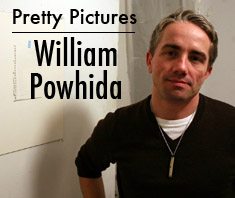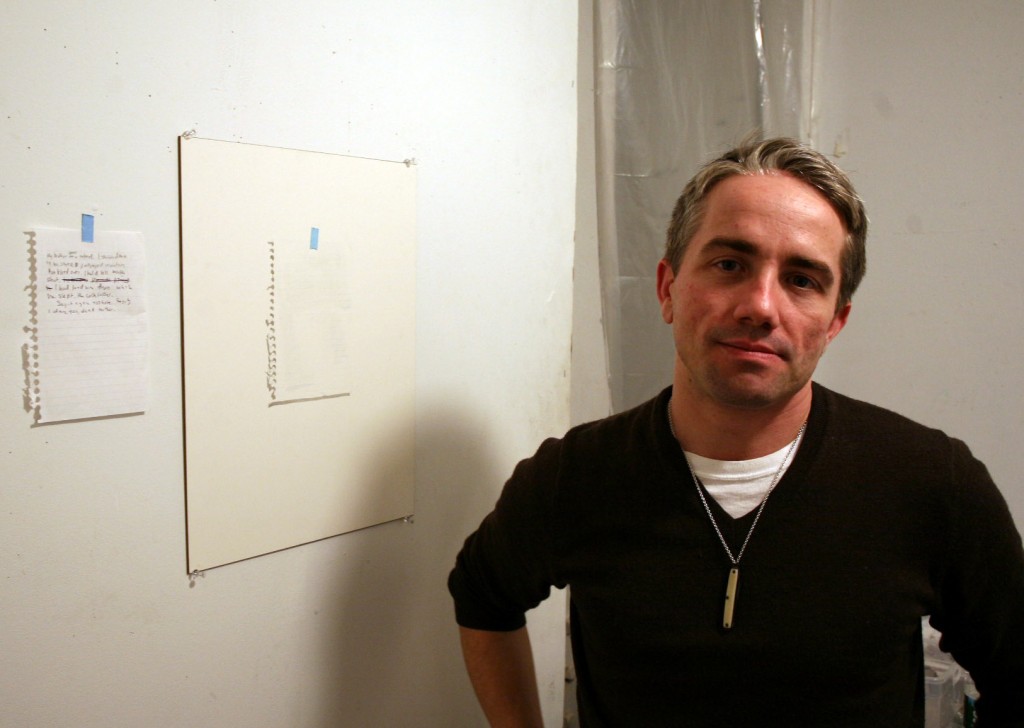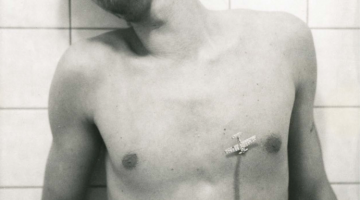Rain on Your Parade:
A Studio Visit with William Powhida
written by: Dean Dempsey, SFAQ correspondent and NYC based artist
I first came across William Powhida’s work in ArtLies magazine (which included a Picasso quote on the inside flap, “art is a lie that makes us realize truth” – why do people quote that guy so often?). I found William’s work painfully clever, both for its message and the simplicity of the graphite and watercolor paper lists, painted to effect of being color Xeroxes of hand-written notes. His work chronicles the thoughts, rejections, criticisms, hierarchies and falsity of the art world in the style of lists or letters that sometimes have the feeling of being drug-induced and frantic. So, in the tiny New York art scene, I’ve been able to see his work a few times in person, and each time it seems to just get more witty, daring and angry.
This past summer William had a show at the Marlborough Gallery in Chelsea entitled “POWHIDA” that centered on a paid actor that posed as a hyper-egotistical characterture of the “artiste”. The actor had clocked out and gone home by the time I caught the exhibition in its final week. Rumor had it the show included free absinthe and blow, so I admit to feeling rather silly when I showed up with my drinking hat and a four inch straw ready for an afternoon of sniffling fun. There was only one piece left hanging on the wall, a final fuck you and thanks for the good time you sorry assholes kind of letter. In fact I remember the janitor mopping the floor during gallery hours and staring at him until realizing it was in fact a custodial worker and not another twist to the performance. How Duchampian! Point of this is I left sober. Boo.
More recently William had another solo-exhibition at Postmasters called “Derivatives”, which we discuss in the interview. If you’re already familiar with his work but know nothing about him, you might imagine him as neurotic and easily agitated (and perhaps he is but hides it really well). But instead he’s incredibly personable and articulate, nothing like the loathing mad man you might visualize. However when I transcribed this interview, I had to slow his voice down a few notches in order to type it creating a very gloomy, deep voice akin to Darth Vadar, which is exactly who you should picture when reading this.
What did you take from you past two solo shows this year?
The show at Marlborough was really trying to satirize the branding of artists, the reputation of galleries and Marlborough’s bluechip status. It was really an art world satire on a bunch of different levels with concerns about how the art world is connected to the 1%. The art world has always had a relationship with patronage, but right now, it isn’t about how we are so dependent on the 1%, but how the 1% made that money. And the fact the income inequality has grown. When the pendulum swings too far in one direction, or gets stretched it becomes grosser than it has been traditionally. It just becomes even more difficult to justify the system when it starts looking really shitty. I was interested in trying to understand the financial crisis and having these shows that revolve around the representation of the “artist” and art world and satirize it was gross and pathetic and fucked up but it kind of did what I thought it would.
In terms “Derivatives” it was less interesting to me what the art world might say about it but I was more interested in talking to somebody like Felix Salmon from Reuters about the financial aspect of it or hoping that would be part of the dialog but as I was working on it Occupy Wall Street breaks out and I didn’t want to capitalize on it and say “hey look here’s my show about this, come check it out”. OWS came after, and that’s probably why the Brian Lehar Show interviewed me. There were really different projects and they represent the two voices within the work, one really satirical, maniacal asshole art world douchebag, and then some of the other drawings that have been critical of the system but haven’t been such an “FU” and just kind of examining how things work, and those are two ends of different inquires and two different methods of working; they are satirical voices but not fully fictional narratives. They blend my own experiences of the liberties of writing, but are not beholden to “this is true”. Because it’s a mix of how I feel and how I’m reacting to things on an emotional level, and not on a completely rational level – I’m not writing cultural theory, I’m not a critic in that sense. Two totally different shows.
Are you an aspiring One Percenter?
No, I’m definitely not 1%. Although it would be nice to not have to think about money. But that’s very different than owning a yacht. But no, it’s not happening. I think I missed the boat on selling out at one point. I think it would be a better decision because nobody judges you on things you haven’t done, it’s just sort of like no one gives a shit.
Does your art sell well?
Yes, but I don’t make that many things a year. If I sell 10 lists at $3200 I get half, and then I have to pay taxes. It’s very quickly not a lot of money. What I was able to sell this year in Miami I think was like 5 drawings. That and half the work I sold in the show, that’s basically my year in terms of making and selling art.
How do you deal with your success around your lesser known friends and colleagues?
Not being a dick about it, and trying to keep it very real about what success really means in terms of still having a day job and not reading too much into the press because nothing is permanent. I’m happier when my friends have a vibrant studio practice, they haven’t quite had the same level of success and I don’t know if I’d wish all of it on them because I’ve taken a different track.
It can be a pain in the ass, I was working on a drawing of dark thoughts, of things that are kind of a joke, or kind of the things that run in the back of my mind when I think about the art world, one of them was “there are no friends or allies in the art world there is only competition”, and it’s horrible to see anyone like that, or to think that way, but the question is where it comes from, having to constantly compare yourself to everyone else.
What would happen if you took the text out of your work?
I’ve thought about it, I don’t know exactly what that would look like, but I don’t know if I would jump straight into formal work, I think there would always be some sort of pre-presentation or something that would call to question exactly what it is you’re looking at. I don’t have any plans on abandoning text – I think I would sooner abandon art and go into writing, or filmmaking, or video, because I think it’s a narrative and not just language.
Would you every use a different language in your work?
There is two threads of work, one is more of a joke than the other, but one would be a translation project, to work with someone to translate the work into French and then playing with that notion of translation, partly because at a certain level you can only go so far with language based work, unless the language is in service to a formal element like Ed Ruscha, where it’s not really the word but the image.
That’s been something I’ve been interested in possibly working on, and then another variation would be to self-censor a bunch of my drawings so they are suitable to publication mainly because there is a lot of places that can’t run profanity, or collections that can’t purchase anything that has profanity, and what that means in relation to the work, since almost all of it has a “Fuck You” or a “Go to Hell”, which is a very conscious low-class move to undercut arts.
What other subjects do you want to address in your work that you haven’t already?
Academia would be one of them. I think also that international relationship to English based work. I don’t want to say it’s a handicap, that notion of being limited in that I really only speak English, and a bit of Spanish, but that’s about it. But I think that was part of this Griftopia show, it was about stepping out of the art world and looking at broader systems or just the whole world as an open subject and the art world was the lens I was seeing the world through.
Are there any artists or writers, dead or alive you’d want to collaborate with? Jeff Koons? You could both make a gigantic Jerry Saltz head rather than his balloon Poodle.
No, no Jeff Koons. I could melt one of his.
I’d like to exchange a series of letters with Ad Reinhardt or something. He was somebody who was trying to comment on the art world and I’ve read a couple of his letters that just rails against his dealers and the commercial system, and it’s like nothing really changes that much, in the 50 years, it’s just gotten bigger and probably more public.
I think it would be kind of awesome to collaborate with the French writer Michel Houellebecq, he just wrote a book on the art world that hasn’t been translated yet but I’d love to read it.
You work clearly takes a social and political stance, what do you hope it changes?
You know at this point I hope that it serves partially as a sort of document to what it was like to be an artist today, that it serve as an alternant history of the boom-time, kind of poking fun at the artists that have been collected and put up, whether it’s Koons, or Hearst, as the artists of this period, which I don’t think will be looked upon as favorably in 50 or 100 years. I try to really think of some of the great Baroque artists, or whatever, I can’t usually remember any of them, but they have these paintings on the salon walls with all the gilded frames, and I’m sure a lot of artists were employed at that period, sold work and had a great time, and then revolution. I think that would be a good outcome for the work, but I also just enjoy the way people interact with it and how they spend time reading it and the kind of feedback I get from people, not just the sales. That’s pretty fulfilling as an artist.
Have you seen Cartsen Höller’s “Experience” at the New Museum?
Not yet, but I saw those slides at the Tate in 2006, looked pretty cool. Did you read Jerry Saltz’ article about it?
I was going to mention it, I thought his comment of “populism masquerading as collectivity” was interesting.
Well in another article he lists Christian Marclay’s “The Clock” as the number one show this year. I didn’t see that piece but I also love film and watch tons of movies, and I think most people in our culture have a much broader knowledge base of film and feel much more comfortable dealing with it because it doesn’t have the same kind of barriers of most art. It was super accessible, and it was the number one piece on his list of top 10 exhibitions, and then he’s saying if it’s a slide, or if it plays on populism in another way or is just to entertain people then it’s bad, I just couldn’t figure out what the fuck his point was in that.
I wasn’t a big fan of the Marina Abramovic’s piece, but not because it drew big crowds but because she’s been elevating herself to this godlike place for awhile now.
I walked through it to see the William Kentridge show with my father, who fucking hates my own art, who came to one of my shows in Brooklyn and said “that graffiti outside is better than this” and he saw her sitting there and I didn’t even bother explaining it, “let’s go look at something you can recognize as art”.
Any words of wisdom for young artists who might read this interview?
I don’t think it’s any wisdom, but you go to school and are trained to think the art world works in a certain way, but I think a much more interesting question is how can it work differently? I’ve been invested in it for a long time. We shouldn’t take anything for granted, it doesn’t always have to be this way, dependant on a system of patronage. That might be my advice.
—
In so many ways William Powhida is just one big party pooper, raining on our art world parade and making us question ourselves and our roles within economic and cultural structures. He is filled with contradictions in using the misfit persona as an indirect tool for celebrity, criticizing wealth and power while developing a career that has positioned those things for himself. But dissenting voices are important to the time we live in now, and although using the master’s tools (or in this case, the master’s hobbies) to challenge the status quo contains some level of paradox, it is still a stance that has garnered respect, including mine. “Know any good jokes?” I asked him. “What’s orange and looks good on hippies? Fire.”




